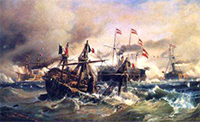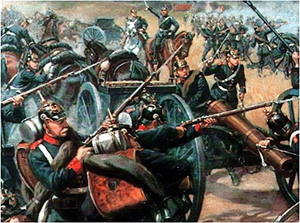The Austro-Prussian War
The Austro-Prussian War of 1866 was a struggle between two former allies that resulted in a resounding victory for Prussia. The two powers had, only two years before, teamed up to fight against Denmark, in a conflict that saw the Danes hand over the largely German-speaking duchies of Holstein, Lauenburg, and Schleswig, to be jointly occupied and run by Austria and Prussia. At the same time, the two powers were the major players in the German Confederation, a collection of states formerly part of the Holy Roman Empire, which French Emperor Napoleon Bonaparte had dissolved in 1806, replacing it with the Confederation of the Rhine. 
Austria and Prussia, after coexisting in ruling the three duchies for a number of months, disagreed on the future of those duchies. A political conflict turned into a military conflict when Prussian troops invaded Holstein in June 1866. In response to a condemnation by the German Confederation, Prussian Prime Minister Otto von Bismarck (left) declared the Confederation null and void and extended Prussian mobilization into Hanover, Hesse, and Saxony. The war had begun. Bismarck had made an alliance with Italy not long beforehand, and Italy agreed to come into the war on the side of Prussia. Austria could count on no other major powers coming to its aid, either because of existing agreements or because of a need to settle things at home. Prussia was much better prepared to fight the war than Austria was. Prussia had modernized its railway and used it successfully to transport troops quickly from one theatre to another. Prussian weapons were also superior to Austrian weapons. Prussia proved this repeatedly during the seven weeks that the war lasted:

Austria had some successes, nearly all of them against Italy, winning at Custoza on June 24 and scoring a strong win at the naval battle of Lissa on July 20. The Italian counterstroke at Bezzecca the following day was the beginning of the end for Austria in the Italian theatre as well. The fighting stopped in late July. French Emperor Napoleon III acted as mediator, securing the Peace of Prague on Aug. 23, 1866. Austria agreed to the dissolution of the German Confederation and to the cession of Hesse, Hanover, Holstein, Nassau, and Schleswig. The Treaty of Vienna, officially ending the war, came on October 12. Austria handed over Venetia to Italy, by way of a secret deal involving France. The swift, stark victory proved Prussian dominance in the realm of German-speaking states. Gone was the Austrian preeminence that had existed since the days of the first Habsburg emperors. |
|
Social Studies for Kids
copyright 2002–2026
David White



 defeating Austria at Náchod on June 27
defeating Austria at Náchod on June 27
